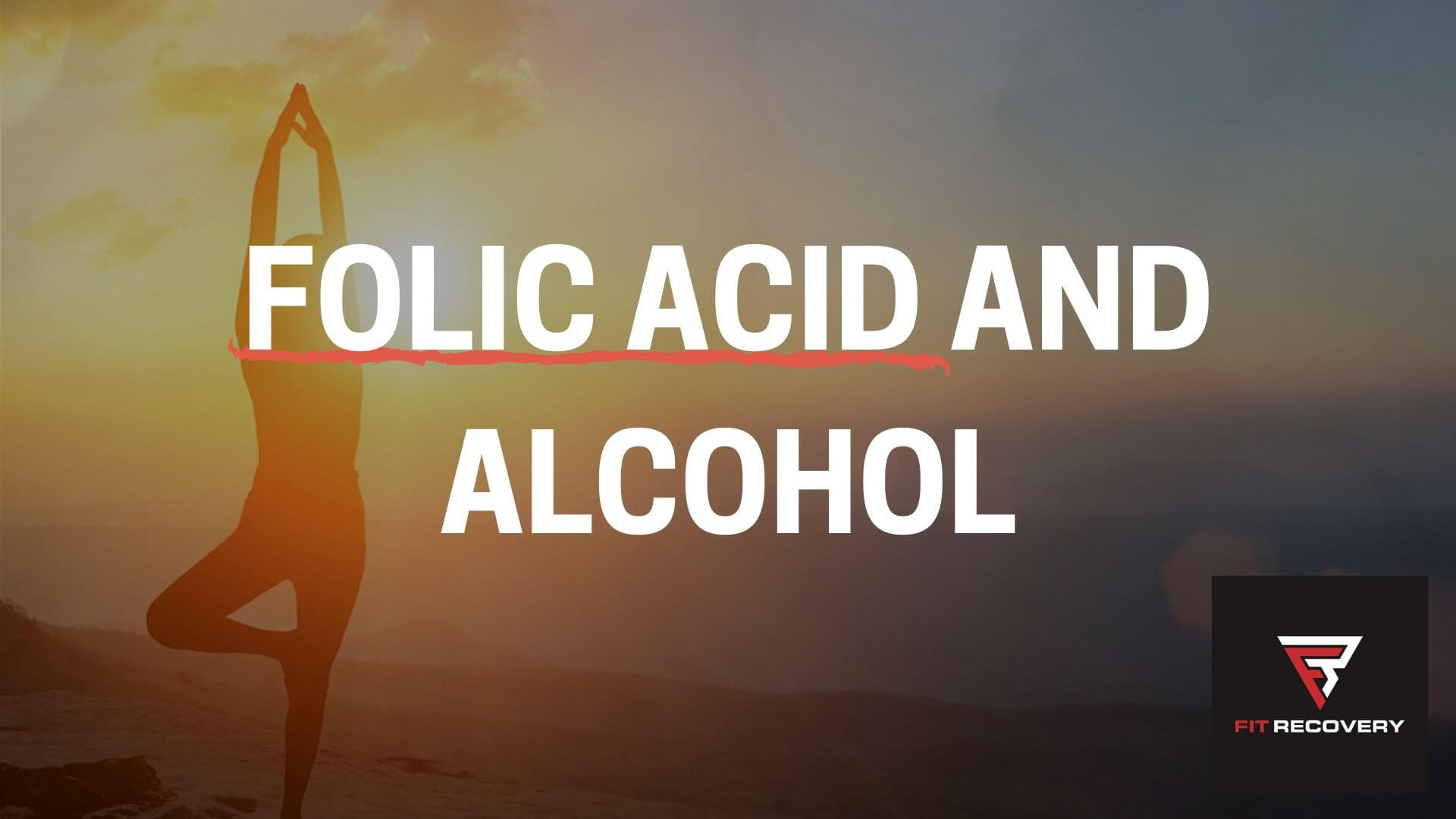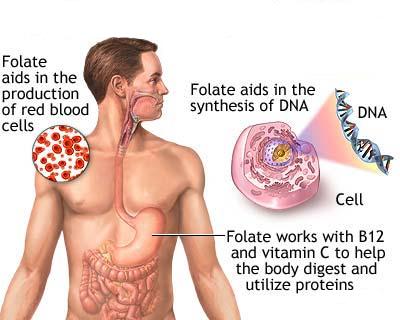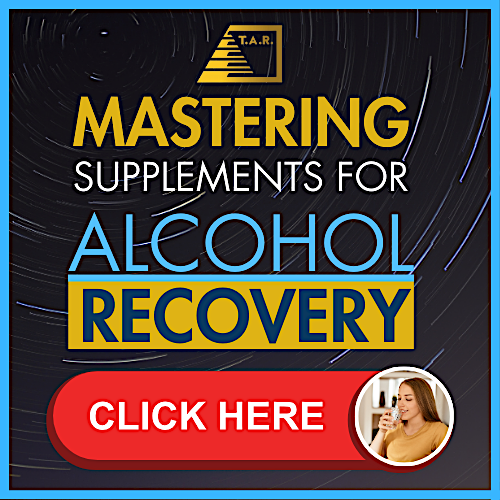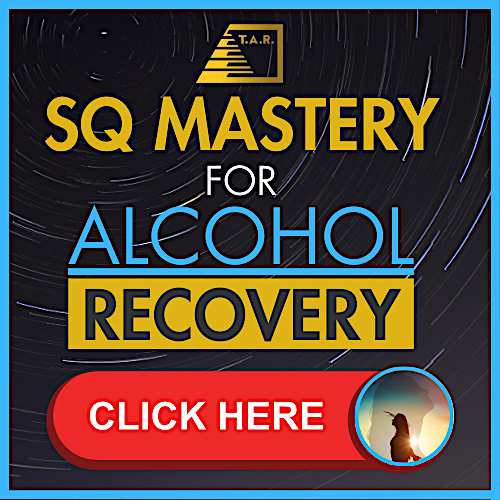The relationship between folic acid and alcohol is well known, especially since prolonged alcohol exposure severely depletes stores of this vitamin. This article will discuss the importance of this vitamin, the symptoms of deficiency, and how to easily repair this deficiency while covering other nutritional bases as well.

This is one of a series of articles on Fit Recovery about basic nutrients that are depleted by alcohol. The mainstream addiction treatment industry all but ignores the role of nutrition in conquering addiction. This glaring omission causes an incalculable amount of preventable suffering.
Fortunately, you’re about to be well ahead of the curve!
Why Do We Need Folic Acid?

Folic acid, also known as vitamin B9, plays an important role in supporting nervous system health and breaking down fats and carbohydrates into energy. While folate is found in small quantities in vegetables, folic acid is a synthetic form of the same vitamin that is found in supplements and fortified food products.
Because this vitamin is extremely important for the development of fetal spinal and brain tissue, pregnant women often supplement with it. As we will see, folic acid deficiencies later in life can cause a variety of problems. Heavy drinking in particular is one of the most common causes of folate deficiency.
Folic acid is necessary for the following bodily processes:
- Building block for nucleic acid, found in all cells in the body
- Generation of new red blood cells
- Proper hearing function
- DNA and RNA repair
- Brain health
- Nervous system health
- Preventing a wide range of health problems
Because alcohol consumption markedly depletes folic acid levels, doctors often recommend that addicts take supplements containing the full range of B vitamins. However, this vitamin is one of the few B-vitamins that can cause toxicity in high doses. Careful attention should be paid to dosage, which we will discuss below.
How Alcohol Depletes Folic Acid

Heavy drinking depletes this vitamin through a number of mechanisms:
- Diuretic effect – Alcohol significantly increases urinary excretion of folic acid, which is taken from the blood and liver.
- Damaged gut lining – Alcohol directly damages the lining of the stomach and intestines, making it harder to absorb this vitamin. Because it is necessary for proper gut absorption, this deficiency makes it even harder to absorb every other nutrient.
- Damaged gut microbiome – Good bacteria that help break down nutrients in food are damaged by alcohol exposure, while harmful strains like candida yeast thrive from alcohol and sugar.
- Foregone calories – Alcoholics tend to make room for liquor, rather than quality foods that are rich in folate.
- Overworked liver and pancreas – Many nutrients are made available to the body by the liver, but the organ cannot process vitamins and minerals when it is preoccupied with detoxifying alcohol (which it only does at about 1 drink per hour).
- Acetaldehyde – This is the most common toxic byproduct from alcohol, causing hangover symptoms, inflammation, and DNA damage that can lead to cancer. Inflammation further decreases nutrient utilization.
Folic acid is stored in the liver, and deficiency is a vicious cycle because low levels of this vitamin in the blood lead to increased excretion of it. As chronic drinking continues, folic acid stores in the liver become even more severely depleted.
Before I quit drinking, I felt strange sensations in my bones and skin that could have been early signs of nerve damage. B-vitamins like this are crucial in reversing nerve damage caused by alcohol addiction.
Symptoms of Deficiency
In one study, eight out of ten chronic drinkers had severely depleted blood folate levels, while nearly half met the criteria for clinical deficiency in this crucial vitamin. (source)
Symptoms of folic acid deficiency include:
- Inability to absorb nutrients
- Liver problems
- Kidney problems
- Gut health problems
- Psychological problems
As we have already discussed, deficiency in folic acid and addiction usually go hand in hand. When I quit drinking, I was deficient in many vitamins and minerals despite being an otherwise active man in my twenties.
The fact that I had an uncharacteristically good diet for someone with severe dependence did not seem to matter. The B supplement that I took for six months after I quit drinking definitely helped me feel better, and fixing my deficiency probably helped in more ways than I understood at the time.
How Much Do Alcoholics Need?

People struggling with addiction need higher doses than the average person with a minor folic acid deficiency. The best way to repair an deficiency is through supplementation.
If I were to quit drinking today, I would take Multi-Nutrient Formulas that contain a huge range of other important nutrients along with methylfolate, the natural form of this vitamin.
Folic acid is just the tip of the iceberg with these supplements. Between them, they contain a lot of powerful nutrients for biochemical repair.
Most of this vitamin’s supplements contain 400 mcg, and the maximum dosage is 1,000 mcg per day. A common brand is Sundown Naturals folic acid, which contains 400 mcg.
I took various B-complexes bought from supermarkets after I quit drinking. None of them are nearly as powerful for repairing the vast spectrum of nutrient deficiencies as Multi-Nutrient Formulas now on the market.
What Food Has the Most Folic Acid?
Fortified cereals and breads contain this, although I personally avoid these foods for other reasons. Dark, leafy greens and cruciferous vegetables like Brussels sprouts are good natural sources of folate.
Since most addicts already have poor gut health, it is difficult for them to absorb enough folic acid from foods alone. Supplementation and in some cases IV infusions can more reliably increase levels.
With this said, here are some foods that are rich in folate:
- 1 cup of lentils – 90% DV
- 1 cup of raw beets – 37% DV
- 1/2 cup of asparagus – 34% DV
- 3 eggs – 18% DV
- 1 cup of raw spinach – 15% DV
- 1 large orange – 14% DV
- 1/2 cup raw broccoli – 14% DV
- 1/2 cup Brussels sprouts – 12% DV
Who is Most at Risk for Deficiency?
While alcohol-dependent people are known to commonly suffer from folic acid deficiency, other groups are at risk as well:
- Pregnant or lactating women
- People over age 65
- People with gastrointestinal disorders
- People with highly restrictive diets (source)
While the recommended intake is 400 mcg to prevent a deficiency, addicts typically benefit from much more than this amount to reverse an alcohol-induced deficiency.
When I recovered from addiction, I got nearly 1,000 mcg per day of this vitamin from supplements and even more folate from my healthy diet.
Should I Take Folic Acid in the Morning or at Night?
Most people prefer to take B-vitamins in the morning because they can increase energy. Folic acid is commonly included in B-complexes that are most often taken in the morning. As it turns out, digestion is faster in the morning than at night, meaning that absorption in the morning may be enhanced.
However, it is not just an energizing compound. It’s necessary for proper neurotransmission, and nighttime is when our brains “reset” and recalibrate levels of important neurotransmitters. Therefore, taking this vitamin at night is not necessarily a bad thing.
During early recovery and beyond, I’ve taken a multivitamin containing folic acid in the morning and night. I’ve never had any issues sleeping due to the consumption of B-vitamins before bed.
Potential Side Effects
Supplemental intake of over 1 mg per day may cause toxicity. Symptoms of excessive folic acid intake can include:
- Stomach ache
- Irritability
- Diarrhea
- Confusion
- Skin changes
- Behavior changes
If you’re struggling with any of the above symptoms of folic acid toxicity, speak to your doctor right away.
A newer concern is the long-term buildup of unmetabolized folic acid (UMFA) in the blood. This occurs from taking too much over time, but it cannot occur from folate derived from foods. It also cannot occur from taking methylfolate, which is a superior and natural form.
UMFA’s can result in some unpleasant side effects:
- Masking of vitamin B12 deficiency
- Accelerated age-related mental decline
- Insulin resistance and slower brain development in children
- Increased risk of cancer re-occurrence
These problems can be prevented by taking supplements that contain methylfolate.
Note: I did not learn about the UMFA issue until well after I finished my own nutrient repair regimen. My bloodwork is great, even after several years of taking high doses (as opposed to methylfolate). I suspect that this issue results from taking very high doses of in the absence of dietary or supplemental folate.
Scientific Research

There’s a lot of scientific research that supports the use of folic acid supplementation for alcoholics:
- Chronic drinking leads to folic acid deficiency and increased folate excretion in the urine
- Folic acid deficiency accelerates alcohol-induced liver damage by lowering antioxidant defenses
- Heavy drinkers who are the most deficient in this vitamin have a significantly higher incidence of cancer and heart disease
- Folic acid and thiamine may be the two most important B-vitamins for people experiencing withdrawal
- Supplementation may reduce the incidence of some cancers for former addicts
Unfortunately, most research money in the U.S. goes to studying prescription drugs instead of basic nutrients that we need to function properly – yet which cannot be patented.
Conclusion
I hope you’ve learned something useful from this article.
With nutritional repair and natural remedies, trial and error is the best approach. I’ve never had a bad reaction to vitamins or natural supplements. Some have simply worked much better than others. The best ones have worked so well that they’ve seriously changed my life.
Basic (high quality) supplements are much safer than prescription drugs that mask the symptoms of underlying nutrient deficiencies. Taking medications for symptoms caused by a nutrient deficiency might even be detrimental, because untreated nutrient deficiencies can cause much more serious complications down the road.
If you have any questions, please post them in the comment box below.

Authors
-
Chris Scott founded Fit Recovery in 2014 to help people from around the world dominate alcohol dependence and rebuild their lives from scratch. A former investment banker, he recovered from alcohol dependence using cutting-edge methods that integrate nutrition, physiology, and behavioral change. Today, Chris is an Alcohol Recovery Coach and the creator of an online course called Total Alcohol Recovery 2.0.
View all posts -
Dr. Rebeca Eriksen is the Nutritional Consultant for Fit Recovery. She has a PhD in Nutritional Genetics from Imperial College London, and over ten years of clinical experience designing custom nutritional repair regimens for patients recovering from alcohol addiction. In addition to her work at the exclusive Executive Health clinic in Marbella, Spain, she helps to keep Fit Recovery up to date with emerging research.
View all posts










My younger sister died of cirrhosis of the liver at 36. She was diagnosed with acute liver failure a year before she passed away. She passed away in 2018. My family and I knew she had an addiction to alcohol. To be honest, she completely shut me out and we hadn’t talked for years by the time she passed away. She burned the bridge and she never looked back. Alcoholism runs in our family. I have never had an issue with alcohol at all, most likely because I don’t touch the stuff. However, I got a diagnosis last year of… Read more »
When I learn real science it motivates me. This is a specific, clear and seemingly well grounded explanation of how all the good, robust colorful PLANTS I am eating are being undermined by vodka. I was JUST eating a monster veggie burger & salad w/brussel sprouts last nite… while drinking. Ouch! I hate that my good nutritional choices are torpedoed by a silly ritual that I know isn’t helping me. But it’s even more inspiring to learn exactly how it is hurting me. You can’t find this science easily if you search for it. I totally believe this kind of… Read more »
Thanks for sharing Miko, I share your sentiments and suspicions! Knowledge is liberating. Keep it up buddy!